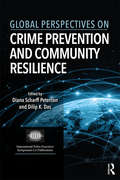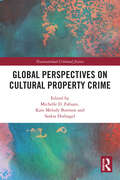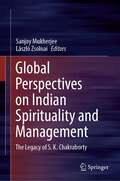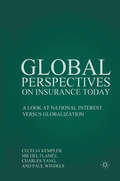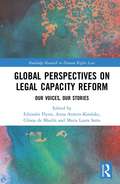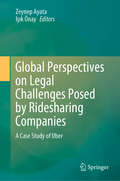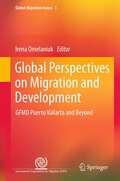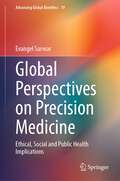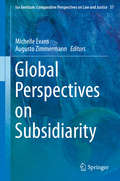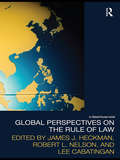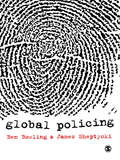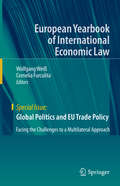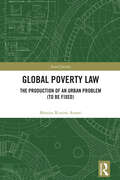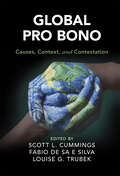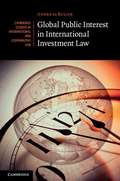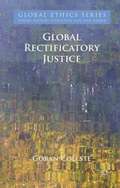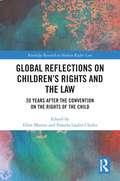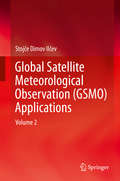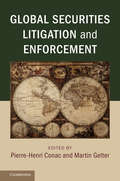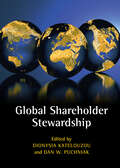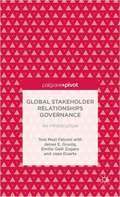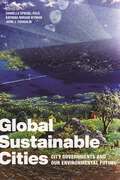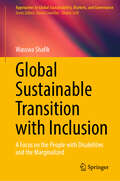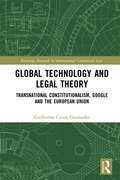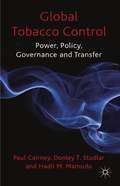- Table View
- List View
Global Perspectives on Crime Prevention and Community Resilience (International Police Executive Symposium Co-Publications)
by Dilip K. Das Diana Scharff PetersonInspired by the dialogue between practitioners and academics of nearly thirty countries, this edited volume includes updated articles on global crime prevention initiatives and best practices in building community resilience presented at the International Police Executive Symposium’s (IPES) 25th annual meeting in Sofia, Bulgaria in 2014. A new book in the highly-regarded IPES Co-Publications series, Global Perspectives on Crime Prevention and Community Resilience offers strategies for crime and violence prevention and community initiatives for crime reduction, while promoting current best practices for police effectiveness, safety, and professionalism. The book includes eighteen chapters from police leaders, practitioners and academics around the world in efforts to demonstrate effective strategies for the prevention of crime and innovative techniques in assisting crime victims. In an increasingly global reality, this text gives voice to valuable members of the international policing community.
Global Perspectives on Cultural Property Crime (Transnational Criminal Justice)
by Michelle D. Fabiani, Kate Melody Burmon and Saskia HufnagelThis book provides transnational insight into cultural property crimes and the cutting-edge work tackling issues ranging from currency crimes to innovative research methods. The volume brings together authors from a number of fields to address contemporary issues and advances in the fight against cultural property crime. It combines the perspectives of law enforcement officials, researchers, journalists, lawyers, and scholars, with specialities in the disciplines of criminology, law, archaeology, museum studies, political science, and economics, from countries all around the globe. This allows for a more comprehensive examination of issues facing these professionals and highlights similarities between the challenges encountered in different disciplines as well as in diverse locations. It seeks to disseminate the most current work in this field from a broad array of viewpoints in order to further facilitate an exchange of ideas and lay the groundwork to inspire future collaborations. Most significantly, it provides more specific suggestions for moving forward that could help assist stakeholders to connect and work directly with each other, despite international borders and discipline-related boundaries. The book will be a valuable resource for researchers, practitioners, and policymakers working in the area of cultural property crime.
Global Perspectives on Indian Spirituality and Management: The Legacy of S.K. Chakraborty
by László Zsolnai Sanjoy MukherjeeThis book brings together a collection of articles from eminent scholars and practitioners from India, Europe, the USA, and Australia and investigates the applicability of spiritually inspired business models in Indian and Western contexts. This book is a tribute to the revered Indian management scholar and philosopher Professor S. K. Chakraborty, a pioneer of human values and Indian ethos in management. It explores the potentials and pitfalls of spiritual-based leadership and provides directions for renewing business education to embrace human values and spirituality. The forty contributions in the book are divided into seven sections—introduction; business ethics and management; developing new organizational models and processes; potentials and pitfalls of spirituality-based leadership; leaders and their world; education, spirituality, and society; ways to go—to bring out different aspects of the spirituality in business model endorsed by Chakraborty. The book is a treasure trove for researchers of not only business ethics, but also of leadership and strategy studies, in addition to the organization professionals and the general reader for expert insights on the topic.
Global Perspectives on Insurance Today
by Charles Yang Cecelia Kempler Michel Flamée Paul WindelsThe book's contributors offer their unique perspectives on challenges confronting the insurance industry and how attendant risks can be most effectively managed.
Global Perspectives on Legal Capacity Reform: Our Voices, Our Stories (Routledge Research in Human Rights Law)
by Eilionóir Flynn Anna Arstein-Kerslake Clíona De Bhailís Maria Laura SerraThis edited collection is the result of the Voices of Individuals: Collectively Exploring Self-determination (VOICES) based at the Centre for Disability Law and Policy, National University of Ireland Galway. Focusing on the exercise of legal capacity under Article 12 of the UN Convention on the Rights of Persons with Disabilities, the stories of people with disabilities are combined with responses from scholars, activists and practitioners, addressing four key areas: criminal responsibility, contracts, consent to sex, and consent to medical treatment. Sustainable law and policy reforms are set out based on the storytellers’ experiences, promoting a recognition of legal capacity and supported decision-making. The perspectives are from across a wide range of disciplines (including law, sociology, nursing, and history) and 13 countries. The volume is a valuable resource for researchers, academics and legislators, judges or policy makers in the area of legal capacity and disability. It is envisaged that the book will be particularly useful for those engaged in legal capacity law reform processes worldwide and that this grounded work will be of great interest to legislators and policy makers who must frame new laws on supported decision making in compliance with the UNCRPD.
Global Perspectives on Legal Challenges Posed by Ridesharing Companies: A Case Study of Uber
by Zeynep Ayata Işık ÖnayThis book examines how regulators and policymakers from nine different countries have dealt with Uber, and initiates a legal dialogue between different jurisdictions that could potentially pave the way to a harmonized approach in regulating Uber. The case studies, conducted in Brazil, Germany, Italy, Mexico, Spain, South Africa, Turkey, the UK and the US reveal the case law and regulatory responses that have been adopted in various areas of law. Legal issues relevant to Uber include market regulation, labor law, civil liability, consumer protection, unfair competition and antitrust law. The book thus compares and contrasts the regulatory policy implications of the disruptive innovation created by Uber in the area of transport services. The book starts with a conceptual overview of the legal challenges posed by Uber and concludes with comparative findings based on the individual case studies. In addition to introducing academics and legal practitioners to the theoretical and practical legal problems they may encounter in connection with Uber, the book will especially appeal to policymakers, who can benefit from and compare the experiences of other jurisdictions.
Global Perspectives on Migration and Development: GFMD Puerto Vallarta and Beyond
by Irena OmelaniukThis volume is the first in a new Springer series to examine one of humanity's most pressing concerns: global migration and its implications for development. As population mobility grows in an ever more crowded world, the Global Forum on Migration and Development (GFMD) has emerged as the most important global mechanism to deal with the urgent challenges it presents. This book explores fresh strategies proposed by the GFMD in its fourth year of operation in Mexico and beyond. Interrogating the relationship between migration and development, the papers advance the Global Forum's aims of reducing poverty and empowering low-income families everywhere. In 2010, there were 214 million international migrants worldwide, nearly two and a half times the number in 1965. By 2050, international migration is likely to expand sharply in scale, reach and complexity, due to growing demographic disparities, environmental change, shifting global political and economic dynamics, technological innovations and social networks. Migration can bring substantial gains to families in less-developed countries, and mobile labor is an axiomatic feature of the global economy. Yet outward migration of skilled workers can seriously retard development at home, and exert pressure on wages in host nations. Balancing these and other conflicting concerns requires the substantive and expert discourse offered in this book. Contributors discuss, and propose concrete solutions to, vital issues such as the debilitating costs of cross-border labor recruitment and the provision of social and income protection for foreign contract workers. With suggestions on how to facilitate connections between transnational families, and gender- and family-sensitive immigration regimes, this book aims to foster collaborative intergovernmental links as well as partnerships between governments, civil society and international organizations. It shows how the GFMD can positively influence policy and institutional behavior while addressing wider systemic factors in protecting mobile workers.
Global Perspectives on Precision Medicine: Ethical, Social and Public Health Implications (Advancing Global Bioethics #19)
by Evangel SarwarThis book presents the promises of Precision Medicine (PM) and the challenges of its implementation in daily clinical routine, while addressing the anticipated ethical and social implications. It is the first book that critically analyzes the potential and the dilemmas relevant to genomics and precision medicine from healthcare, public health and global perspectives. The nine chapters presented in this book elaborate on pharmacogenomics' crucial role in maximizing the potential benefits and minimizing medication's potential risks in groups of people, especially in cancer treatment and other health conditions. Infectious and non-communicable diseases (NCDs) are also discussed in this book by identifying challenges and ways to overcome them. Essential concepts are addressed, such as health-related benefits and harm to individuals and the broader community, including threats to individual privacy and autonomy, which warrant just distribution of scarce resources. The book also identifies and addresses the lack of competency in the healthcare workforce in the era of PM and discusses the path to laying the ethical foundation for the implementation of PM in healthcare organizations.
Global Perspectives on Subsidiarity
by Michelle Evans Augusto ZimmermannGlobal Perspectives on Subsidiarity is the first book of its kind exclusively devoted to the principle of subsidiarity. It sheds new light on the principle and explores and develops the many applications of the principle of subsidiarity. The book provides a comprehensive overview of the principle in all its facets, from its philosophical origins in the writings of Aristotle and Aquinas, to its development in Catholic social doctrine, and its emergence as a key principle in European Union Law. This book explores the relationship between subsidiarity and concepts such as sphere sovereignty and social pluralism. It analyses subsidiarity in light of globalisation, federalism, democracy, individual rights and welfare, and discusses subsidiarity and the Australian, Brazilian and German Constitutions.
Global Perspectives on the Rule of Law (Law, Development and Globalization)
by James J. Heckman Robert L. Nelson Lee CabatinganGlobal Perspectives on the Rule of Law is a collection of original research on the rule of law from a panel of leading economists, political scientists, legal scholars, sociologists and historians. The chapters critically analyze the meaning and foundations of the rule of law and its relationship to economic and democratic development, challenging many of the underlying assumptions guiding the burgeoning field of rule of law development. The combination of jurisprudential, quantitative, historical/comparative, and theoretical analyses seeks to chart a new course in scholarship on the rule of law: the volume as a whole takes seriously the role of law in pursuing global justice, while confronting the complexity of instituting the rule of law and delivering its promised benefits. Written for scholars, practitioners, and policy-makers, Global Perspectives on the Rule of Law offers a unique combination of jurisprudential and empirical research that will be provocative and relevant to those who are attempting to understand and advance the rule of law globally. The chapters progress from broad questions regarding current rule of development efforts and the concept of rule of law to more specific issues pertaining to economic and democratic development. Specific countries, such as China, India, and seventeenth century England and the Netherlands, serve as case studies in some chapters, while broad global surveys feature in other chapters. Indeed, this impressive scope of research ushers in the next generation of scholarship in this area.
Global Policing: Police Power In Global Context (Onati International Series In Law And Society Ser.)
by James W.E. Sheptycki Ben BowlingIn the transitional networked society, police power is no longer constrained by the borders of the nation state. It has globalised. Global Policing shows how security threats have been constructed by powerful actors to justify the creation of a new global policing architecture and how the subculture of policing shapes the world system. Demonstrating how a theory of global policing is central to understanding global governance, the text explores: - the 'new security agenda' focused on serious organised crime and terrorism and how this is transforming policing - the creation of global organisations such as Interpol, regional entities such as Europol, and national policing agencies with a transnational reach - the subculture of the 'global cops', blurring boundaries between police, private security, military and secret intelligence agencies - the reality of transnational policing on the ground, its effectiveness, legitimacy, accountability and future development. Written by two leading international experts who bring cutting-edge theoretical debates to life with case studies and examples, Global Policing will prove captivating reading for students and scholars in criminology, criminal justice, international relations, law and sociology.
Global Politics and EU Trade Policy: Facing the Challenges to a Multilateral Approach (European Yearbook of International Economic Law)
by Wolfgang Weiß Cornelia FurculitaThis book explores how the European Union designs its trade policy to face the most recent challenges and to influence global policy issues. It provides with an interdisciplinary perspective, by combining legal, political, and economic approaches. It studies a broad set of trade instruments that are used by the EU in its trade policy, such as: trade agreements, multilateral initiatives, unilateral trade policies, as well as, internal market tools. Therefore, the contributions to this volume present the EU’s Trade Policy through different lenses providing a complex view of it.
Global Poverty Law: The Production of an Urban Problem (To Be Fixed) (ISSN)
by Moniza Rizzini AnsariThis book demonstrates how the various legal efforts employed to eradicate global urban poverty also play a significant role in shaping it.Urban poverty has been widely examined as a social problem that requires attention and social commitment. Law is often seen as both an important contributor to the problem as well as a source of crucial tools to overcome it. In spite of this, however, poverty is surprisingly disregarded within legal scholarship. This book counters this by drawing on legal theory, legal history, and legal geography to inquire how urban poverty is made visible and invisible as a problem across global cities. More specifically, it investigates the mechanisms and networks through which global urban poverty has been conceptually and materially shaped in a way that fits the remit of global corporate philanthropy and the development aid agenda. By following law’s circuitous interactions with poverty knowledge and antipoverty interventions, the book demonstrates how it plays a historical role in making poverty seen, known, and remedied. As a result, the book argues, law consolidates a stable image of poverty as an essential ‘problem’ – to be uniformly found worldwide and so reasonably fixable with the appropriate legal reforms. Taking poverty to be a fundamental manifestation of social injustice, the book thus raises key questions about the role of law in the achievement of social justice.This innovative and insightful account of the relationship between law and poverty will appeal to scholars in critical and socio-legal studies, as well as others working in poverty studies, urban studies, development studies, geography, sociology, and social policy.
Global Pro Bono: Causes, Context, and Contestation
by Scott L. Cummings Louise G. Trubek de Sa e Silva, FabioThe principle and practice of pro bono, or volunteer legal services for poor and other marginalized groups, is an increasingly important feature of civil justice systems around the world. Recent surveys have identified pro bono initiatives in more than eighty countries—including Colombia, Portugal, Nigeria, and Singapore—and the list keeps growing. Covering the spread of pro bono in across five continents, this book provides a unique comparative dataset permitting the first-ever analysis of pro bono's growing role in access to justice globally. The contributors are leading experts from around the world, whose chapters explore both the internal roots of and global influences on pro bono in transnational context. Global Pro Bono explores the dramatically expanding geographical and political reach of pro bono: documenting its essential contribution to bringing more justice to those on the margins, while underscoring its complex and contested meaning in different parts of the world.
Global Public Interest in International Investment Law
by Andreas KulickThe strengths of international investment law - above all, a strong focus on investor interests and an effective adjudication and enforcement system - also entail its weaknesses: it runs the danger of impeding or even sanctioning the host states' legitimate regulatory interests and ignoring other fields of public international law. How does it cope with public interest concerns such as human rights, the environment or the fight against corruption? At the heart of this book lies a fresh approach towards a general theory of such global public interest considerations in the investment realm. Delineating how and why those considerations matter, and why the current system does not accommodate them properly, Andreas Kulick fleshes out general principles and customary international law as defences the host state may raise against alleged investor rights infringements and promotes proportionality as the appropriate balancing mechanism.
Global Rectificatory Justice (Global Ethics Series )
by Göran CollsteWhat are the implications of colonialism for a theory of global justice today? What does rectificatory justice mean in the light of colonialism? What does global rectificatory justice require in practice? The author seeks to answer these questions covering a significant gap in the literature on global justice.
Global Reflections on Children’s Rights and the Law: 30 Years After the Convention on the Rights of the Child (Routledge Research in Human Rights Law)
by Ellen Marrus Pamela Laufer-UkelesThirty years after the adoption of the UN Convention of the Rights of the Child, this book provides diverse perspectives from countries and regions across the globe on its implementation, critique and potential for reform. The book revolves around key issues including progress in implementing the CRC worldwide; how to include children in legal proceedings; how to uphold children’s various civil rights; how to best assist children at risk; and discussions surrounding children’s identity rights in a changing familial order. Discussion of the CRC is both compelling and polarizing and the book portrays the enthusiasm around these topics through contrasting and comparative opinions on a range of topics. The work provides varying perspectives from many different countries and regions, offering a wealth of insight on topics that will be of significant interest to scholars and practitioners working in the areas of children’s rights and justice.
Global Satellite Meteorological Observation (GSMO) Applications: Volume 2
by Stojče Dimov IlčevThis book presents principal structures of space systems functionality of meteorological networks, media and applications for modern remote sensing, transmission systems, meteorological ground and users segments and transferring weather data from satellite to the ground infrastructures and users. The author presents techniques and different modes of satellite image interpretation, type of satellite imagery, spectral imaging properties, and enhancement of imaging technique, geo-location and calibration, atmospheric and surface phenomena. Several satellite meteorological applications are introduced including common satellite remote sensing applications, weather analysis, warnings and prediction, observation and measurements of meteorological variables, atmosphere and surface applications, ocean and coastal applications, land, agriculture and forestry applications, and maritime and aviation satellite weather applications. The author also covers ground segment and user segment in detail. The final chapter looks to the future, covering possible space integrations in meteorological and weather observation.This is a companion book of Global Satellite Meteorological Observation Theory (Springer), which provides the following topics:Evolution of meteorological observations and history satellite meteorologySpace segment with satellite orbits and meteorological payloadsAnalog and digital transmission, type of modulations and broadcasting systemsAtmospheric radiation, satellite meteorological parameters and instrumentsMeteorological antenna systems and propagation
Global Securities Litigation and Enforcement
by Pierre-Henri Conac Martin GelterGlobal Securities Litigation and Enforcement provides a clear and exhaustive description of the national regime for the enforcement of securities legislation in cases of misrepresentation on financial markets. It covers 29 jurisdictions worldwide, some of them are important although their law is not well known. It will be an invaluable resource for academics and students of securities litigation, as well as for lawyers, policy-makers and regulators. The book also provides a comprehensive contribution debate on whether public or private enforcement is preferable in terms of development of securities markets. It will appeal to those interested in the legal origins theory and in comparative securities law, and shows that the classification of jurisdictions within legal families does not explain the differences in legal regimes. While US securities law often serves as a model for international convergence, some of its elements, such as securities class actions, have not been adopted worldwide.
Global Shareholder Stewardship
by Dan W. Puchniak Dionysia KatelouzouThis is the first in-depth comparative and empirical analysis of shareholder stewardship, revealing the previously unknown complexities of this global movement. It highlights the role of institutional investors and other shareholders, examining how they use their formal and informal power to influence companies. The book includes an in-depth chapter on every jurisdiction which has adopted a stewardship code and an analysis of stewardship in the world's two largest economies which have yet to adopt a code. Several comparative chapters draw on the rich body of jurisdiction-specific analyses, to analyze stewardship comparatively from multiple interdisciplinary perspectives. Ultimately, this book provides a cutting-edge and comprehensive understanding of shareholder stewardship which challenges existing theories and informs many of the most important debates in comparative corporate law and governance.
Global Stakeholder Relationships Governance: An Infrastructure
by James E. Grunig Toni Muzi Falconi Emilio Galli Zugaro Joao DuarteBy arguing and detailing the elements of a soft and hard infrastructure approach to the process of global stakeholder relationships governance, this book integrates advanced, flexible and feasible tools to develop an organization's listening culture; integrated reporting as an ongoing process of continued multi-stakeholder reporting.
Global Sustainable Cities: City Governments and Our Environmental Future
by Danielle Spiegel-Feld, Katrina Miriam Wyman, and John J. CoughlinPerspectives from worldwide experts on how major cities across the globe are responding to the major environmental threats of our time, including global climate change Over half of the world’s population now lives in cities, and this share is expected to increase in the coming decades. With growing urbanization, cities and their residents face substantial environmental challenges such as higher temperatures, droughts, wildfires, and increased flooding. In response to these pressing challenges, some cities have begun to develop local environmental regulations that supplement national and environmental laws. In so doing, cities have stepped into a role that has been historically dominated by higher levels of government.Global Sustainable Cities takes stock of the policies that have been implemented by cities around the world in recent years in several key areas: water, air pollution, greenhouse gas emissions, and climate adaptation. It examines the advantages—and potential drawbacks—of allowing cities to assume a significant role in environmental regulation, given the legal and political constraints in which cities operate.The contributors present a series of case studies of the actions that seven leading cities—Abu Dhabi, Beijing, Berlin, Delhi, London, New York, and Shanghai—are taking to improve their environments and adapt to climate change. The first volume of its kind, Global Sustainable Cities is a critical comparative assessment of the actions that major cities in the global North and South are taking to advance sustainability.
Global Sustainable Transition with Inclusion: A Focus on the People with Disabilities and the Marginalized (Approaches to Global Sustainability, Markets, and Governance)
by Wasswa ShafikThis book provides a comprehensive exploration of inclusive, sustainable development, emphasizing the critical need to integrate the perspectives and needs of people with disabilities and marginalized communities into the global sustainability transition to a sustainable future. Through highlighting the intersectionality of identity and the unique challenges faced by these groups, the book addresses a pressing issue: the often-overlooked barriers that hinder their full participation in sustainable transitions. Organized into three parts, the book first contextualizes the relationship between sustainability and inclusion. It delves into the historical and theoretical frameworks that shape our understanding of marginalization, exploring how disability intersects with various social identities. This foundation sets the stage for an in-depth analysis of the United Nations Sustainable Development Goals (SDGs) and the ways in which they can be made more inclusive, ensuring that no one is left behind. The second part identifies and examines the myriad barriers to inclusion within sustainable practices. It addresses structural, socioeconomic, and cultural obstacles that perpetuate exclusion while also critiquing existing policy frameworks for their limitations in addressing the needs of marginalized populations. Through case studies, the book highlights successful initiatives and innovative practices that promote accessibility and equity, mainly through the use of assistive technologies and community engagement. In the final section, the book outlines actionable strategies for fostering inclusive, sustainable development. It emphasizes the importance of community engagement, participatory decision-making, and the empowerment of marginalized voices. Additionally, it discusses metrics for monitoring and evaluating the impact of sustainability initiatives on people with disabilities, providing a framework for accountability and continuous improvement. This book aims to bridge the gap between sustainability and social justice, offering a roadmap for stakeholders, policymakers, and practitioners committed to creating a more inclusive world. This book targets academics, policymakers, non-profit societies, and activists working at the intersection of sustainability and social equity and serves as a vital resource for those seeking to understand and promote inclusive practices in the global sustainable transition.
Global Technology and Legal Theory: Transnational Constitutionalism, Google and the European Union (Routledge Research in International Commercial Law)
by Guilherme Cintra GuimarãesThe rise and spread of the Internet has accelerated the global flows of money, technology and information that are increasingly perceived as a challenge to the traditional regulatory powers of nation states and the effectiveness of their constitutions. The acceleration of these flows poses new legal and political problems to their regulation and control, as shown by recent conflicts between Google and the European Union (EU). <P><P> This book investigates the transnational constitutional dimension of recent conflicts between Google and the EU in the areas of competition, taxation and human rights. More than a simple case study, it explores how the new conflicts originating from the worldwide expansion of the Internet economy are being dealt with by the institutional mechanisms available at the European level. The analysis of these conflicts exposes the tensions and contradictions between, on the one hand, legal and political systems that are limited by territory, and, on the other hand, the inherently global functioning of the Internet. The EU’s promising initiatives to extend the protection of privacy in cyberspace set the stage for a broader dialogue on constitutional problems related to the enforcement of fundamental rights and the legitimate exercise of power that are common to different legal orders of world society. Nevertheless, the different ways of dealing with the competition and fiscal aspects of the conflicts with Google also indicate the same limits that are generally attributed to the very project of European integration, showing that the constitutionalization of the economy tends to outpace the constitutionalization of politics. <P><P> Providing a detailed account of the unfolding of these conflicts, and their wider consequences to the future of the Internet, this book will appeal to scholars working in EU law, international law and constitutional law, as well as those in the fields of political science and sociology.
Global Tobacco Control
by Paul Cairney Donley T. Studlar Hadii M. MamuduThe first major book by political scientists explaining global tobacco control policy. It identifies a history of minimal tobacco control then charts the extent to which governments have regulated tobacco in the modern era. It identifies major policy change from the post-war period and uses theories of public policy to help explain the change.
